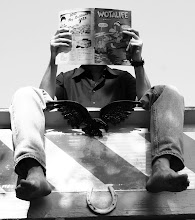The following illustrated novella,
Black Weather, was created, as a gift for a friend, in the fall of 2007. Inspired to revisit my earliest approach to graphic storytelling, that of wholly improvised, panel-to-panel, page-to-page creation, I set out, over the course of two weeks, to fill a small, 4“ x 6”, 82-page sketchbook (a cheaper variant of the perennial Moleskine, amusingly named “a la Modeskin”). My goal was to utilize the entire book, allowing for no mistake that would have required removing a page, leaving the edition intact, transformed into a tiny, original, one-of-a-kind “automatic picture book”. Accomplishing this, to some surprise, I must admit, I wrote and illustrated a story that shaped itself as I turned the pages, leading to a conclusion that seemed to craft itself. I can claim no sole ownership of the tale that follows, rather I see myself as a conduit for its telling, a fable channeled through the vibrancy and mystery of the moment, strung together with the enduring bond of friendship, presented now, with the blessing of its owner, for all to experience.
Understanding the fashion in which it was born, please allow for any spelling and/or grammatical burps, to say nothing of narrative coherence. Technical particulars: All text and line art came from a Pilot brand P-500, extra-fine pen. The greytones were created with brush, using ink washes.
I will be presenting
Black Weather in 10-page “scroll” installments, over the next few weeks, of which this is the first. I hope you might enjoy it, automatically, as it were.






















